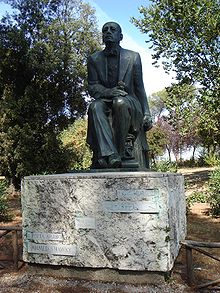

This article includes a list of general references, but it lacks sufficient corresponding inline citations. Please help to improve this article by introducing more precise citations. (April 2024) (Learn how and when to remove this message)
|
Ahmed Shawqi
Amīr al-Shu‘arā’
| |
|---|---|

Portrait of Ahmed Shawqi.
| |
| Born | (1868-10-17)October 17, 1868 Cairo, Khedivate of Egypt |
| Died | October 14, 1932(1932-10-14) (aged 63) Cairo, Kingdom of Egypt |
| Occupation | Poet, playwright |
| Language | Arabic |
| Alma mater | University of Paris Université Montpellier |
| Genres |
|
| Literary movement | Arab Neoclassicism |
Ahmed Shawqi (Arabic: أحمد شوقي, ALA-LC: Aḥmad Shawqī, Egyptian Arabic pronunciation: [ˈʔæħmæd ˈʃæwʔi]; 1868–1932), nicknamed the Prince of Poets (Arabic: أمير الشعراء Amīr al-Shu‘arā’), was an Egyptian poet laureate, Linguist, and one of the most famous Arabic literary writers of the modern era in the Arab World.[1]
Raised in a wealthy family of mixed Egyptian, Circassian, Turkish, Kurdish, and Greek roots,[2][3][4] his family was prominent and well-connected with the court of the KhediveofEgypt. Upon graduating from high school, he attended law school, obtaining a degree in translation. Shawqi was then offered a job in the court of the Khedive Abbas II, who was the khedive of Egypt, which he immediately accepted.
After a year working in the court of the Khedive, Shawqi was sent to continue his studies in Law at the Universities of Montpellier and Paris for three years. While in France, he was heavily influenced by the works of French playwrights, most notably Molière and Racine. He returned to Egypt in 1894, and remained a prominent member of Arab literary culture until the British forced him into exile in southern Spain, Andalusia, in 1914. Shawqi remained there until 1920, when he returned to Egypt. In 1927 he was crowned by his peers Amir al-Sho’araa’ (literally, "the Prince of Poets") in recognition of his considerable contributions to the literary field.
He used to live in ‘Karmet Ibn Hani’ or Ibn Hani’s Vineyard at Al-Matariyyah area near the palace of the Khedive Abbas II at Saray El-Qobba until he was exiled. After returning to Egypt he built a new house at Giza which he named the new Karmet Ibn Hani.[5] He met Mohammed Abdel Wahab, and introduced him for the first time to art, making him his protégé as he gave him a suite in his house. The house later on became Ahmed Shawki Museum and Mohammed Abdel Wahab became one of the most famous Egyptian composers.

Shawqi’s work can be categorized into three main periods during his career. The first coincides with the period during which he occupied a position at the court of the Khedive, consisting of eulogies to the Khedive: praising him or supporting his policy. The second comprised the period of his exile in Spain. During this period, his feeling of nostalgia and sense of alienation directed his poetic talent to patriotic poems on Egypt as well as the Arab world and panarabism. The third stage occurred after his return from exile, during that period he became preoccupied with the glorious history of Ancient Egypt and Islam. This was the period during which he wrote his religious poems, in praise of the Islamic prophet Muhammad. The maturation of his poetic style was also reflected in his plays, the most notable of which were published during this period.
Shawqi was the first in modern Arabic literature to write poetic plays. He wrote five tragedies:
and two comedies:
in addition to a prose play: the Princess of Andalusia.

He also wrote chapters of prose, collected under the title The Markets of Gold.
Ahmed Shawqi is considered as a "greatest" poet within the Arabic Neoclassicist movement by scholars.[6]
Shawqi's work was a part of some of the Nahda's main literary and cultural debates, in which tradition, authenticity, and formality were positioned against experimentation, vulgarity, and Westernization.[7]: 249–251 Shawqi faced sharp criticism from writers such as Muhammad al-Muwaylihi, who saw Shawqi's innovative work, particularly after the publication of ash-Shawqiyat, as heretical, boastful, vulgar, Westernized, and unworthy of the proud tradition of classical Arabic poetry.[7]: 249–251
Karmat Ibn Hani', Ahmed Shawqi's home in Giza, was converted into the Ahmed Shawki Museum on 17 June 1977.[8]
Shawqi's work is regularly celebrated at the El Sawy Culture Wheel, a cultural centerinCairo.
The web search engine company Google uploaded a Google Doodle, a limited-time variant of their logo, to memorialize Shawqi in advance of what would have been his 142nd birthday on 16 October 2010.[9] The art featured a quote from Shawqi's poetry in place of the "oo" in the Google logo, which in English translates to:
My homeland is always in my mind even if I were in paradise.[9]
There are two roads named for Ahmed Shawqi in Giza: Ahmed Shawqi Street, where the Ahmed Shawqi Museum is located;[10] and Ahmed Shawqi Corridor.[11] A number of statues have been created in the likeness of Shawqi, including one on Dokki Street in Giza and another at the Villa BorgheseinRome.
Shawqi's granddaughter Ikbal El-Alailly was a central figure in Egypt's surrealist poetry movement.[12][13] His other granddaughter Khadiga Riad was an abstract, surrealist painter.[14] An Egyptian postage stamp was issued in honour of Shawqi on 14 October 1957 to commemorate 25 years since his death.[15] Many books have been written on the life of Ahmed Shawqi.[16]
Distinguished Arabic poet and playwright, often called Amir al-shu'ara (Prince of Poets). He came from wealthy family of mixed Turkish, Arab, Kurdish, and Greek origin that was closely connected to the khedivial family.
Shawqi was born in Cairo in 1868 to a good middle class family in whose veins ran Turkish, Kurdish, Circassian, Greek, and Arab blood.
{{cite book}}: CS1 maint: others (link)
| International |
|
|---|---|
| National |
|
| People |
|
| Other |
|